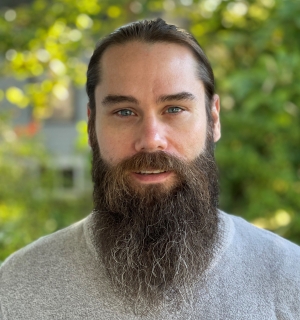Meet Ryan Smith, the Engineer Helping Develop Medical Device Technologies at UMB
Friday, July 28, 2023
Over the past five years, University of Maryland, Baltimore (UMB) has seen a steady increase in the number of medical device technologies emerging from the University. In response, the UM Ventures, Baltimore team – UMB’s technology transfer and commercialization arm – created a robust framework of programming, space, and staff to support our inventors.

Through hands-on collaboration with UMB’s researchers, Ryan uses his expertise in mechanical engineering to help design and refine functional prototypes. He then leverages a 3D printing lab, housed in the University of Maryland School of Medicine (UMSOM), to create the prototypes. A technology typically requires several rounds of design and printing until Ryan and the inventor have a prototype that successfully proves the basic technical concepts of the technology.
“I’m a huge fan of designing and fabricating things," said Ryan. “Each project I’ve worked on presents a new challenge – a new puzzle to solve – which is really fun.”
“For new medical device technologies, a functional prototype can be a critical resource on the path to commercialization,” said Phil Robilotto, associate vice president of technology transfer at UMB and director of UM Ventures, Baltimore. “The data gathered from a prototype can support intellectual property protection, advance the technology so it is easier to secure funding, and de-risk the technology, making it more appealing for investors. All of this ultimately helps move more device technologies to the market where they can improve the quality of life for patients around the world.”
For one project, Ryan worked with Rajabrata Sarkar, MD, PhD, the Barbara Baur Dunlap Professor of Surgery at the UMSOM, to design and fabricate a prototype for an Automatic Vascular Access Device (AVAD). The device uses advanced techniques to make marking and targeting vessels easier for users. The AVAD prototype that Ryan helped develop was used for key benchtop testing. Ryan and Dr. Sarkar’s prototyping work was initially funded by a UM Ventures, Baltimore Sprint grant awarded to help advance prototype development of this potentially important medical device.
Creating the prototype required resources from the UM Ventures, Baltimore Medical Device Prototyping Lab and the Robert E. Fischell Institute for Biomedical Devices at the University of Maryland, College Park. Ryan’s effort with the Fischell Institute was integral to Dr. Sarkar’s recent $150,000 Maryland Innovation Initiative (MII) award, which will build on the growing patent portfolio for the technology.
"Ryan's ability to rapidly make prototypes and continuously modify them shows the critical importance of having College Park and Fischell Institute engineers work on both the Baltimore and College Park campuses,” said Dr. Sarkar. “His ability to meet with me each week for hands-on design modifications provided an essential link to College Park engineering expertise for my MII grant application."
“Ryan has been a wonderful partner who has enhanced our technology. His ease of conceptual grasp is tremendous, and he has gone above and beyond to facilitate weekend work sessions.” commented Bartley P. Griffith, MD, FACS, FRCS, co-founder of Breethe, and the Thomas E. and Alice Marie Hales Distinguished Professor of Transplant Surgery and Director of the Cardiac and Lung Transplant Programs at UMSOM. “The prototyping has given our team confidence to take design of our medical device to the next step. We are now approaching considerations of how to build for fixed design trials.”
Ryan has a natural inclination to brainstorm, test new ideas, and get hands-on with his work. Early in his career, this led him to build and run his own business focused on remanufacturing automotive electronic devices. After several years, he enrolled at the University of Maryland, College Park (UMCP), where he earned a degree in mechanical engineering, a field that would allow him to continue pursuing his passion for product design and development. Since graduating from UMCP, Ryan has taught Computer Aided Design courses at UMCP and served as a faculty specialist in the Robert E. Fischell Institute for Biomedical Devices.
“Working with Ryan has allowed us to accelerate the development of our device,” said Aakash Shah, MD, a resident at the University of Maryland Medical Center. “His experience with mechanical design and insight into modes of testing have helped take our idea to an early prototype. He is a pleasure to work with and incredibly collaborative.”
The UM Ventures, Baltimore Medical Device Prototyping Lab operates out of the UMSOM’s Brody 3D Printing Lab, which was created to provide physicians with a cutting-edge tool for patient care. Realizing the additional potential, the UM Ventures, Baltimore team partnered with UMSOM and the Robert E. Fischell Institute for Biomedical Devices to use the lab to develop 3D prototypes of medical device technologies.
Ryan's door is always open. “If you are looking to build and test a prototype, or you are just interested in talking and learning more about what we can offer, come on down to the lab! We have access to a variety of design tools, 3D printers, computer numerical control (CNC) equipment, and fabrication tools. I’m always happy to show people around or have a conversation.”
To learn more about developing a medical device at UMB, contact Ryan Smith at [email protected].